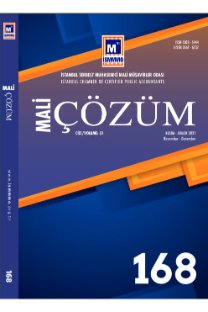YALIN ÜRETİM SİSTEMİ VE MUHASEBEYE ETKİLERİ
İşletmeler piyasada rekabet edip ayakta kalabilmek için Japon üretim sistemlerinin de etkisiyle, müşteri odaklı üretime yönelmişlerdir. Bu yaklaşım müşterilerin beklentilerini karşılayan ve maliyetleri kontrol ederek düşürmeyi hedefleyen yeni bir yöntemi gerekli kılmıştır ki bu da yalın üretim sistemidir. Yalın üretim sistemi, geleneksel muhasebe sisteminin ürettiği veriler ile birlikte kullanıldığında, karar alma aşamasında birtakım eksiklikler ortaya çıktığı görülmektedir. Bu eksiklikleri gidermek adına yalın üretimin kontrol ve karar verme amaçlarına uygun bilgiler sağlayan yalın muhasebe geliştirilmiştir. Bu çalışmanın amacı, yalın üretim ortamında yalın muhasebe bilgilerinin karar verme sürecinde etkili olup olmadığını açıklamaktır. Bu amaçla yalın üretim yaklaşımı ve yalın muhasebeye yönelik literatür taraması yapılarak yalın üretim ortamında muhasebe bilgilerinin kullanımına ilişkin bir örnek incelenmiştir. İnceleme sonucunda, değer akış maliyet sistemine göre hesaplanan maliyetlere göre sipariş alınmasının işletme lehine kârlı bir karar olduğu görülmektedir. Yalın düşünce ve yalın üretim sisteminin, üretim sürecindeki atıkları azaltarak bilgi kullanıcıları için daha anlaşılabilir bir raporlama sistemi geliştireceği düşünülmektedir.
LEAN MANUFACTURING SYSTEM AND ITS EFFECTS ON ACCOUNTING
Companies go towards customer-oriented production with the influence of Japanese production systems.to compete and survive in the market. This approach requires a new method of meeting customer expectations and aiming at controlling and reducing costs, which is a lean production system. The lean production system has been confirmed to cause deficiencies in using the information generated by the traditional accounting system for decision making. Lean accounting has been developed to provide appropriate information to the control and decision-making purposes of lean production for avoiding these deficiencies. The purpose of this study is to explain whether lean accounting information in a lean production environment is effective in decision making process. For this purpose, a literature review of the lean production approach and the lean accounting has been conducted and an example of the use of accounting information in the lean production environment has been examined. It is seen that taking the order according to the cost calculated according to the value flow cost system is a profitable decision in favor of the company in the examined sample. It is thought that the lean thinking and lean production system will develop a more understandable reporting system for information users by reducing waste in the production process.
___
- Arora, V. and Soral, G. (2017). Conceptual Issues in Lean Accounting: A Review, IUP Journal of Accounting Research & Audit Practices, 16 (3): 54-63
- Can, A.V. ve Güneşlik, M. (2013). Yalın Yönetim Felsefesinin Önemli Bir Boyutu Olarak Muhasebede Yalınlaşma Düşüncesi Ve Bir Yalın Muhasebe Uygulaması Örneği, Muhasebe ve Finansman Dergisi, 57: 1-23
- Fullerton, R. R., Kennedy, F. A. ve Widener, S. K. (2013). Management Accounting And Control Practices In A Lean Manufacturing Enviroment. Accounting, Organization And Society, 38: 50-71
- Hutchinson, Robert ve Liao, Kun. (2009). Zen Accounting: How Japanese Management Accounting Supports Lean, Management Accounting Quarterly, 11 (1): 27-35
- Institute Of Management Accountants (2006). Accounting For Lean Enterprise: Major Changes To The Accounting Paradigm, Strategic Cost Management, New Jersey
- Kennedy, F. A. and Widener, S. K. (2008). A Control Framework: Insight From Evidence On Lean Accounting, Management Accounting Research, 19: 301-323
- Kroll, K. M. (2004). The Lowdown On Lean Accounting, Journal of Accountancy, 198 (1): 69-76.
- Maskell, B. H. What Is Lean Accounting? (Erişim Tarihi: 14.12.2014) http:// www.maskell.com/lean_accounting/subpages/lean_accounting/components/ What_is_Lean_Accounting.pdf adresinden
- Maskell, B. H., Boggaley, B. and Grasso, L. (2011). Pratical Lean Accounting, Florida: CRC Press
- Ofileanu, D. (2015). Aspect Regarding The Application Of Lean Accounting In Taking The Managerial Decisions, Ovidius University Annals, Economic Sciences Series, 15 (1): 941-944
- Rao, M. H. S. and Bargerstock, A S. (2013). Do Lean Implemention Initiatives Have Adequate Accounting Support?, Management Accounting Quarterly, 14 (4): 12-21
- Ruiz de Arbulo Lopez P., Fortuny Santos, J. and Cuatrecasas Arbós, L. (2013). Lean Manufacturing: Costing The Value Stream. Industrial Management & Data Systems, 113 (5): 647-668.
- Shah, R. and Ward, P. T. (2003). Lean Manufacturing: Context, Practice Bundles And Performance, Journal Of Operation Management, 21: 129-149
- Simboli, A., Taddeo, R. and Morgante, A. (2014). Value And Wastes İn Manufacturing: An Overview And A New Perspective Based On Eco- Efficiency. Administrative Science, 4: 173-191
- Stenzel, J. and Serge, P. (Eds). (2007). Lean Accounting Best Practices For Sustainable Integration, Canada: Wiley
- Yu-Lee, R. T. (2011). Proper Lean Accounting. Industrial Engineer, 43 (10): 39-43
- ISSN: 1303-5444
- Yayın Aralığı: Yılda 6 Sayı
- Başlangıç: 1991
- Yayıncı: İstanbul Serbest Muhasebeci Mali Müşavirler Odası
Sayıdaki Diğer Makaleler
İŞLETME LİSANS ÖĞRENCİLERİNİN TİCARİ BELGE VE DEFTERLER ÜZERİNDEKİ ALGI DÜZEYLERİNİN BELİRLENMESİ
Servet ÖNAL, İsa KILIÇ, AHMET ALATAŞ
VERGİ AVANTAJLARI BOYUTUYLA GIDA BANKACILIĞI SİSTEMİ1
TURİST VERGİSİ: YABANCI ÜLKE UYGULAMALARI VE TÜRKİYE’DE UYGULANABİLİRLİĞİ ÜZERİNE BİR İNCELEME
YEDİEMİNLİK MÜESSESESİ VE VERGİLENDİRİLMESİ
YALIN ÜRETİM SİSTEMİ VE MUHASEBEYE ETKİLERİ
İrem KEFE, Bilal Zafer BERİKOL
SORUMLULUK MUHASEBESİNİN FAALİYET DENETİMİ UNSURLARINA ETKİSİNİN DEĞERLENDİRİLMESİ
